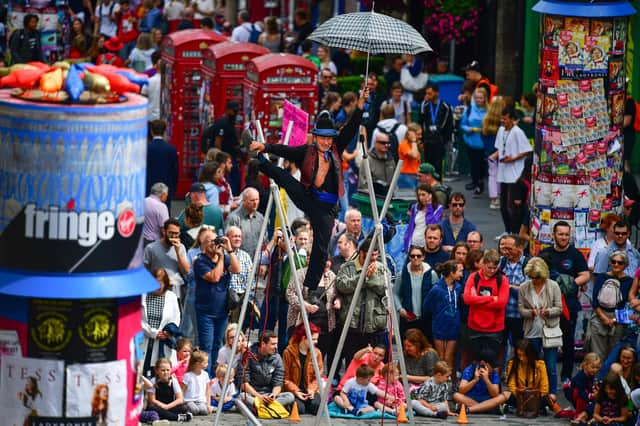Edinburgh festivals: Why UK Government should extend furlough scheme for cultural sector – Angus Robertson


The sunny conditions and easing of lockdown rules are welcome relief for us all and signals an early start to summer. Most of us will have taken the opportunity to see loved ones over the weekend, enjoyed the outdoors and hopefully seen some light at the end of the pandemic tunnel.
Summers in Edinburgh are normally enlivened by the arts festivals which have come to help define Scotland’s capital as one of the finest cultural cities in the world. However, because of Covid-19, for the first time since 1947 there will be no Edinburgh International Festival, there will also be no Edinburgh Fringe, no Royal Edinburgh Military tattoo, no Edinburgh Book Festival, no Edinburgh International Film Festival and the many other arts events we have become used to over the decades.
Advertisement
Hide AdAdvertisement
Hide AdWhile some people are beginning to be able to consider when and how they might return to work in the months ahead, the cultural community faces unique challenges in getting through the lockdown. In the last week, warnings were made that 70 per cent of theatres are facing financial ruin. Truth is that some of our best-loved cultural institutions and venues may not make it to next year when we hope the Edinburgh festivals will be able to return and boost the cultural and business life of the capital.
Managing cultural venues, companies and festivals is challenging enough in normal times, but with the pandemic, lockdown and postponement of programmes and events, it is financially unsustainable. It also risks losing skills and people to alternative places and careers where work might be available. In truth, much of the arts infrastructure has been agile but fragile, and we risk a lot without significant additional intervention, innovation and support from the public and government(s).
A couple of weeks ago Edinburgh’s Lyceum Theatre announced it is going into hibernation, postponing all performances and events for the rest of 2020 after losing more than £700,000. Artistic director David Greig and colleagues have had painful decisions to make to give themselves a fighting chance to come back in 2021. Many others are facing similar pressures.
Even after the main lockdown phases have been lifted, there is a justified fear that people will be slow to return to public events. This makes it even more difficult for cultural planners to anticipate when things might “return to normal”. Scotland’s arts bodies have being doing a lot to keep things going financially thus far, and the Scottish Government has been proactive, but the existential squeeze to the sector is only just beginning to be felt.
Advertisement
Hide AdAdvertisement
Hide AdEdinburgh must survive and flourish as a leading cultural capital, not just for the artistic and economic life of the city but Scotland as a whole. Millions of pounds and thousands of jobs depend on this.
The cultural scene is uniquely placed to bring us together after the coronavirus pandemic. There are already efforts to play a role in the meantime using virtual technology.
However it has to get through this crisis first, which is why new thinking and new initiatives are required to protect and support our cultural community and all who work in it.
An early start would be for the UK Government to extend the furlough scheme beyond October for the cultural sector and commit to more support for the self-employed. Changes to VAT should also be considered.
A message from the Editor
Advertisement
Hide AdAdvertisement
Hide AdThank you for reading this story on our website. While I have your attention, I also have an important request to make of you.
In order for us to continue to provide high quality and trusted local news on this free-to-read site, I am asking you to also please purchase a copy of our newspaper.
Our journalists are highly trained and our content is independently regulated by IPSO to some of the most rigorous standards in the world. But being your eyes and ears comes at a price. So we need your support more than ever to buy our newspapers during this crisis.
With the coronavirus lockdown having a major impact on many of our local valued advertisers - and consequently the advertising that we receive - we are more reliant than ever on you helping us to provide you with news and information by buying a copy of our newspaper.
Thank you
Joy Yates
Editorial Director
Comment Guidelines
National World encourages reader discussion on our stories. User feedback, insights and back-and-forth exchanges add a rich layer of context to reporting. Please review our Community Guidelines before commenting.